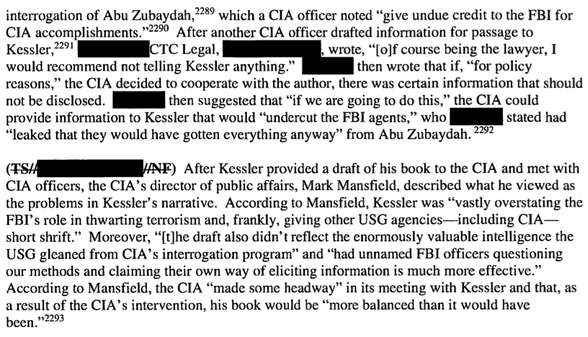The Senate Intelligence Committee report on CIA torture of terrorism suspects not only reignited a national debate over the former interrogation policies, but also shed light on how the agency manipulated media coverage of the secret programs.
Despite federal laws that prohibit the leaking of classified information — not to mention frequent complaints from the Bush Administration that such leaks harmed national security — top agency officials sanctioned the behavior in order to improve the CIA’s public image, according to the Democratic-backed study. The information shared with the press overstated the effectiveness of the agency’s brutal tactics. And once that information found its way into newsprint or airwaves, the report said, the CIA did not report the potentially illegal disclosures.
“We either get out and sell, or we get hammered, which has implications beyond the media,” Philip Mudd, deputy director of the CIA’s Counterterrorism Center, wrote in an internal memo in April 2005, according to the report. “Congress reads it, cuts our authorities, messes up our budget. We need to make sure the impression of what we do is positive…we must be more aggressive out there. We either put out our story or we get eaten. There is no middle ground.”
The highly redacted report, eight pages of which focuses on the CIA’s aggressive PR strategy, shows how the CIA’s legal counsel attempted to shield the agency by masking the source of positive media spin — deliberate “obfuscation,” as one attorney put it. Officials danced around the legal justification of several such moves. In one case, they opted against investigating how classified information appeared in a book because then-Director George Tenet “blessed” the project. These backroom media dealings were generally confined to top-level officials and the agency’s Office of Public Affairs.
 In 2005, when officials pondered assembling a list of foiled terrorist plots to showcase before an NBC Dateline piece, one CIA officer questioned the release of such information in an email to several agency attorneys. “There are no CIA records indicating a response to the officer’s email,” the report said.
In 2005, when officials pondered assembling a list of foiled terrorist plots to showcase before an NBC Dateline piece, one CIA officer questioned the release of such information in an email to several agency attorneys. “There are no CIA records indicating a response to the officer’s email,” the report said.
There is some dispute over whether such CIA disclosures amounted to illegal “leaks” of classified information. Whereas the Democratic-backed report, which garnered the lion’s share of media attention this week, painted them as such, GOP members of the Senate Intelligence Committee disagreed.
“Our examination of the record revealed that the CIA’s disclosures were authorized and that the CIA’s representations about the program were largely accurate,” they wrote in their Minority Views of the report.
The official CIA response to the study similarly denies that classified information was leaked to the press. What’s more, it rejects the insinuation that the agency engaged with the media “for the purpose of avoiding oversight or that there was a coordinated, systemic public relations campaign to garner support for the program.”
While the agency’s records from the period are “fragmentary,” its response said, “the vast majority of CIA’s engagement with the media on the program was the result of queries from reporters seeking agency comment on information they had obtained elsewhere.” (Emphasis theirs) An agency spokesman declined to comment further on the record.
Other episodes outlined by Senate Democrats illustrated the CIA’s craving for good press — not unique among government agencies — often showcased by officials’ jealousy when news reports gave credit to FBI counterterrorism efforts. When author Ronald Kessler approached the agency’s media arm about a book project in 2007, officials pushed back against his proposed narrative of the interrogation of Saudi detainee Abu Zubaydah.
 Kessler’s book eventually had a much more favorable portrait of CIA efforts — its media outreach worked. The former Washington Post reporter called the Senate report “absurd and a fraud” in an interview with Fox News’ Howard Kurtz this week. “My track record is I call it like it is,” he added, “and I’ve exposed the CIA many times over their foibles.”
Kessler’s book eventually had a much more favorable portrait of CIA efforts — its media outreach worked. The former Washington Post reporter called the Senate report “absurd and a fraud” in an interview with Fox News’ Howard Kurtz this week. “My track record is I call it like it is,” he added, “and I’ve exposed the CIA many times over their foibles.”
The Senate report also lays out how the agency worked with Douglas Jehl, then a reporter for The New York Times, for a proposed story about Abu Zubaydah. That cooperation cost Jehl a “detailed outline” of the piece, the report said, citing anonymous officials’ emails. He also “informed the CIA that he would emphasize that the CIA’s enhanced interrogation techniques worked,” according to the report.
“I am proud of the work that my Times colleagues and I did in bringing these CIA practices to light,” Jehl, now foreign editor of The Washington Post, said in a statement Tuesday. “I was not interviewed for the Senate report, and would never comment on reporting that was based on confidential conversations with current and former US government officials.’’
David Uberti is a writer in New York. He was previously a media reporter for Gizmodo Media Group and a staff writer for CJR. Follow him on Twitter @DavidUberti.
